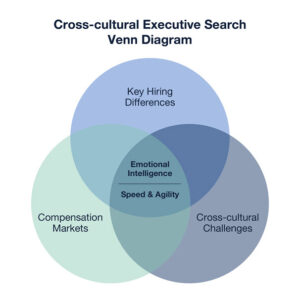At DSML, an executive recruiting firm based in Boston and Chicago, we pride ourselves in providing the very best executive search recruitment work through highly-nurtured relationships and continuous improvement of our tools and platforms. Of course, a significant part of this entails keeping a close pulse on the industry. As a firm specializing in recruiting for European subsidiaries in the US, this actually means keeping a pulse on multiple markets in tandem, using one to interpret the other and apprise the strategies we provide our clients with.
However, to accurately be able to assess and leverage the current happenings of our industry, as well as continue to propel the world of executive recruiting forward, Myriam and Doug, DSML’s co-founders of the executive search firm in Boston and Chicago, believe it’s important to reflect on what has been. As Maya Angelou eloquently said, “If you don’t know where you’ve come from, you don’t know where you’re going.”
“What Has Been” for Executive Search
Few know that the practice of executive search was actually instituted in the 1940s. As a result of postwar prosperity, businesses in the US and Europe had to adapt and become competitive in building out their teams and finding the best-suited executives to help carry that prosperity forward with the lifespan of their companies. As is often the case, the demand rose and the supply followed suit, leading to the formation of executive search recruitment as a profession. By the late 1950s, associations like the Association of Executive Search and Leadership Consultants (AESC) began to form, helping guide the practice and provide standards of excellence.
In 2020, the global executive search industry was estimated to be worth 18 billion euros. This number is only set to increase as companies continue to expand their practices to establish a global presence.
“What Is” for Executive Search
For almost the last two years now, the world of hiring has been shaken to its core by the Great Resignation, the effects of which have been in some ways significant on the executive search firms industry. At the start of 2022, the labor department shared a report stating that with 6.3 million unemployed people at the end of November and 10.6 million job openings, there were 1.5 jobs per potential candidate. Today’s executive talent has more options and flexibility in their quest for their next role. This means that searches need to be conducted quicker than ever, as companies compete for talent. This further highlights the importance of establishing best practices to work with the right executive search firm. In a candidate-driven market, companies — and more importantly, the executive search firms they hire — need to be agile and have clear, streamlined processes in place to win over candidates. As the foremost executive search firm in Boston and Chicago, we are constantly looking for ways to increase the quality of our process and with efficiency through emerging tools.
According to the AESC, expertise across industry, function, and market was respondents’ single most important criteria for selecting an executive search firm today. At DSML, as we are recruiting for European subsidiaries in the US, we service expanding companies across many industries, from manufacturing to technology, medical devices, IoT, and SaaS. Co-founder Myriam Le Cannellier has honed her executive search practice in the recruiting niche for subsidiaries of European companies for over 15 years.
“What Will Be” for Executive Search
“Recruiting executives has never been easy; in our current environment, it is even more challenging,” DSML co-founder Myriam Le Cannellier recently shared on LinkedIn.. “The cultural component adds another layer of difficulty for any European company in need of an executive for their US subsidiary.”
For hiring European companies to see success in filling their key US executive hires, they will need to prioritize understanding three major elements:
 1. Key hiring differences between the US and Europe: Knowing these key differences in executive search recruitment will help navigate the hiring process in a much smoother fashion. Salary is most likely the first that comes to mind, however, there are many nuances to factor in about major components of a benefits package. For example, in Europe insurance is run by a uniform government, and vacation is mandated by law.
1. Key hiring differences between the US and Europe: Knowing these key differences in executive search recruitment will help navigate the hiring process in a much smoother fashion. Salary is most likely the first that comes to mind, however, there are many nuances to factor in about major components of a benefits package. For example, in Europe insurance is run by a uniform government, and vacation is mandated by law.
2. Compensation markets: Because compensation in the United States is generally far higher, notably in the sales field, a company needs a certain level of investment to set up an operation in the US. Companies recruiting for European subsidiaries in the US will need to immerse themselves in the differences and understand that there is a learning curve that comes with expansion.
3. Cross-cultural challenges: These challenges can be numerous in juxtaposing two cultures during a company’s expansion phase. In the case of a merger & acquisition, the acquiring company needs to be prepared to manage cultural differences in their executive search recruitment process between themselves and the acquired company.
These culminate the elements that live in the Reuleaux triangle of the cross-cultural executive search Venn diagram. The first of these is emotional intelligence. Finding the right candidate for your executive hires can help propel your company forward. When evaluating prospective candidates, it’s easy to assess years of industry experience on paper. Moving forward, European companies that successfully expand their businesses into the US are those that place equal importance on both technical and industry expertise and soft skills, such as emotional intelligence and communication skills. The second Reuleaux element is speed and agility. Timing is crucial in executive search, where the priority is matching candidates and clients in mutually beneficial pairings. Through technology and innovation, DSML has been able to make for a faster process in executive search recruitment. In an increasingly competitive market, DSML can help set up your US subsidiary for success, both quickly and with quality candidates.
If your company is seeking to recruit for a key executive position such as CEO, COO, President, VP, or other Senior level roles, contact us.

